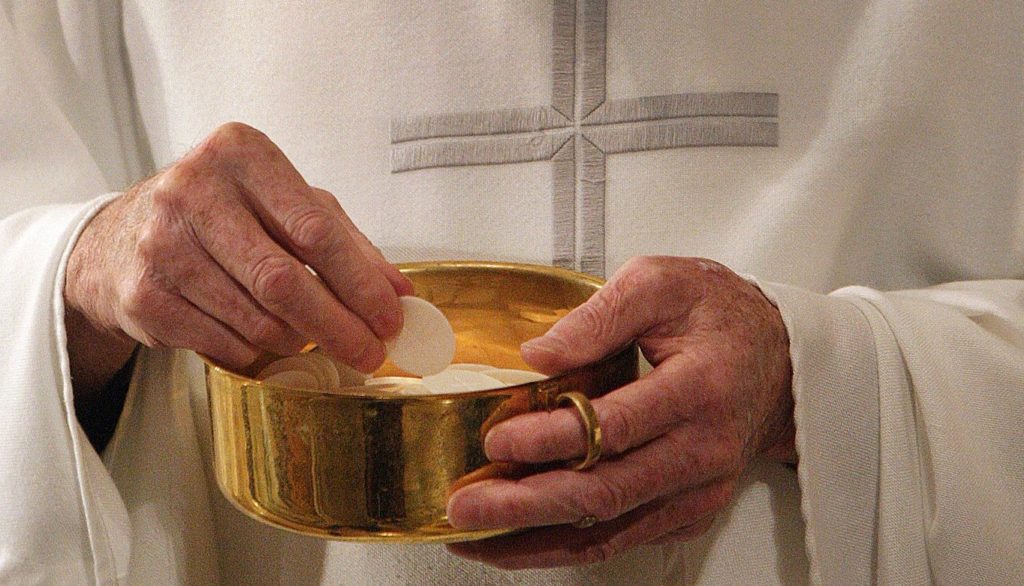After a long and heated virtual debate, the bishops of the United States Conference of Catholic Bishops (USCCB) approved the drafting of a formal statement on the meaning of the Eucharist in the life of the Church, which would include a section dedicated to the coherence of life and actions of those who receive Holy Communion.
As expected, the discussion in which virtually 43 bishops intervened showed the polarization on the issue among the U.S. hierarchy. Despite this, the wording of such a statement was approved by 168 votes in favor, 55 against and 6 abstentions. Although there is no final version of the document, the bishops have worked on an outline that has served as a guideline for discussion.
The final draft will be completed in the coming months for approval and, if necessary, publication at the Fall General Assembly in November. The document is being coordinated by the USCCB Doctrine Committee, chaired by Bishop Kevin C. Rhoades, Bishop of Fort Wayne-South Bend, Indiana.
Central themes
The document addresses three central themes: the Real Presence of Jesus Christ in the Holy Eucharist; unity and identity as the source and apex of Christian life; missionary discipleship and Eucharistic coherence. Although most of the bishops have not objected strongly to the first two themes of this outline, the third part is delicate, because although the document would be addressed to all the Catholic faithful of the country, without mentioning names, it has behind it first level public actors: President Joe Biden and some American politicians, particularly from the Democratic Party, who promote and defend policies in favor of abortion, euthanasia and same-sex unions.
No matter how much the prelates may have twisted the final declaration, pointing out that there is no specific addressee and that it is only a formative instrument, the desired or undesired message has not gone and will not go unnoticed. While the issue does not seem to keep the U.S. president awake at night or at peace, Democratic politicians have already responded to the bishops: don't turn Communion into a weapon against us. During a press conference on June 18, when reporters asked the president for his opinion that such a statement could deny him access to Communion, Biden responded: "It's a private matter and I don't think it's going to happen.
Those who did express their disagreement were 60 congressmen of the Democratic Party, who on June 18 issued a message to the prelates: "do not deny us this sacrament, the most sacred of all". The Democratic legislators acknowledge in this statement that many of their policies are openly against the teachings of the Church, but add that "no political party aligns itself perfectly with all aspects of Church doctrine." But while "we practicing Catholic Democratic legislators" are threatened with denial of communion for supporting "a woman's safe and legal access to abortion," no one has threatened Republican legislators (of the other party) for their advocacy in favor of "policies contrary to Church teaching, such as: 'support for the death penalty, separation of migrant children from their parents, denial of asylum to those seeking safety in the United States, limitation of assistance for the hungry, denial of rights and dignity for immigrants,' say 60 Democratic lawmakers."
During the Assembly, Bishop Rhoades indicated that the text was never intended to present norms for the reception of the Eucharist, but to serve as a teaching tool about Communion. The document, Rhoades said, was intended to encourage the faithful to return to Mass and to help them understand and revive belief in the Real Presence.
In addition to the decline in Mass attendance due to the pandemic, the majority of U.S. Catholics do not believe in the Real Presence of Jesus Christ in the Eucharist, according to a Pew Research Center study published in August 2019. According to this study, 70% of them believe that the Eucharist is only "a symbol" and only 30% of Catholics believe in the Real Presence. Part of the solution to this challenge is not only the proposal of the formal declaration but the initiative called "Eucharistic Revival", a 3-year project that would begin in July 2022 and would be implemented at parish, diocesan and national levels. This initiative envisages events, conferences, catechesis, formative materials on the Eucharist, the promotion of Eucharistic Adoration in parishes, as well as a National Eucharistic Congress in the summer of 2024.
In the coming months, the final document will continue to be drafted for approval at the November General Assembly. José H. Gomez, Archbishop of Los Angeles and President of the USCCB, said: "The Bishops' Conference Committee on Doctrine will begin drafting this document now, and in the coming months the bishops will continue to pray and discern through a series of regional meetings and consultations. In November, the bishops will meet to discuss the draft document. Our desire is to deepen our people's awareness of this great mystery of faith and to awaken their wonder at this divine gift, in which we have communion with the living God. That is our pastoral purpose in writing this document."
In addition, in the coming months, the bishops will be able to propose, remove or add to the text, but it will also be a time to reflect on its terminology and the political times in the USA. And while the first two formative sections on the Real Presence are necessary at this time in the U.S. Church - given the decline in Mass attendance, disbelief and lack of formation on the subject of the Real Presence among most U.S. Catholics - the third part on consistency of life in receiving Communion is a sensitive topic that will continue to be discussed and debated. It would be desirable to include in that section terminology that helps to form without dividing, to accompany and dialogue without shaming or excluding, always fostering unity, as the Apostolic Nuncio Christophe Pierre pointed out in his inaugural address to the work of this Assembly.








